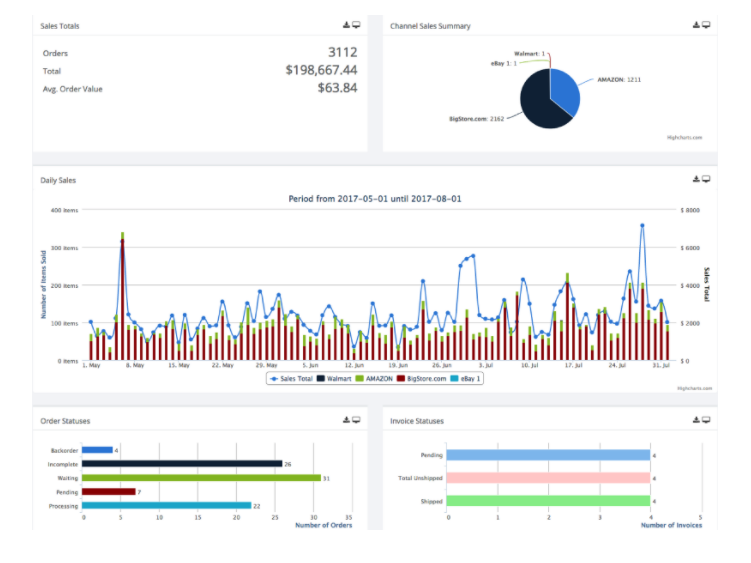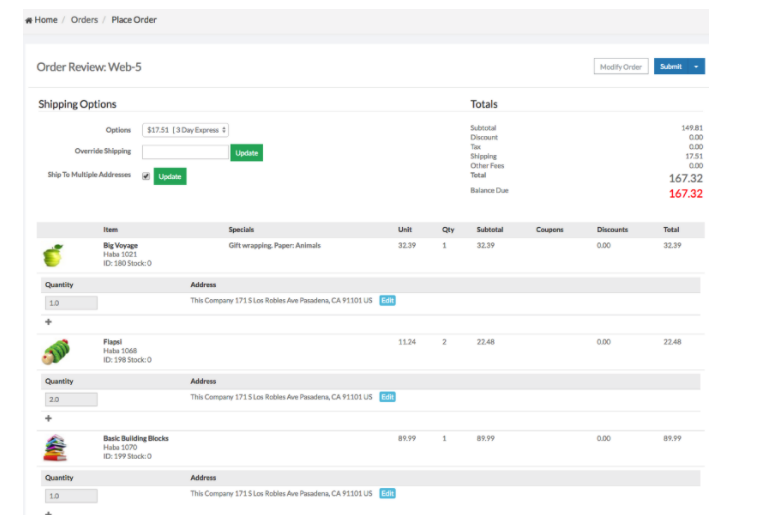
Despite the need to access data to manage both logistics and business as a whole, many online retailers still rely on spreadsheets to run their business.
Although an extremely flexible tool that has existed for decades, eCommerce managers often feel too comfortable with manual intervention technology (ie., spreadsheets) -- but at what cost?
The numerous problems and risks associated with manual intervention of data should make you think twice about using them for your business.
To help you put these concerns into context, let’s explore the top 12 ways spreadsheets can negatively impact your online business, and what you can do to overcome them.
1. You’re Losing Hours Each Month
Inputting numbers into spreadsheets is an incredible time-waster.
In terms of hours per month, it’s barely an improvement on filling out paper forms. Plus, once you’ve finished with a spreadsheet, it can only provide you with basic information. To receive actionable insights and create workflows, you need to put in yet more work.
2. Revenue Leakage is all but Guaranteed
Although 2018 looks to be a strong year for online sales, lost revenue is not something small -- or any size business -- can afford to ignore. The scariest part is, if you’re using spreadsheets to keep track of revenue, you may be losing money without you even knowing.
Without a fully integrated accounting or financial system in place, you may be experiencing a shocking amount of revenue leakage impacting your bottom line, due to:
- Inaccurate data entries - Everything from customer and sales information to accounting data may rely heavily on manual intervention.
- Lost invoices - Busy people forget things. If you’re busy, it’s not uncommon to forget to send or lose track of an invoice. Problem is, your customers likely won’t go out of their way to pay something they haven’t been charged for.
- Profitability is harder to rationalize - Topline sales are increasing. Great! However, your bottom line and overall profit seem to be dwindling. Perhaps the cost of a component of a product has changed, or maybe the cost of a service is higher than anticipated. Whatever the reason may be, a system that doesn’t automatically analyze sales against cost could be hurting your profitability.
- Damaging Discounts - Rebates and discounts are wonderful mechanisms for generating topline sales and making high-volume purchases. However, manual intervention of data makes it next to impossible to understand if the discounts are hurting or helping profitability.
3. Spreadsheets are no match for GAAP Compliance

Generally Accepted Accounting Principles -- GAAP -- the rules and procedures “that companies must follow when they compile their financial statements,” are at serious risk of error when regulated via spreadsheets. Although spreadsheets are a powerful business tool, they rely on manual intervention to conduct properly, and this leads to human fault.
This level of adoption simply falls short, as we humans are extremely susceptible to error no matter how methodical or how experienced we may be.
Mistakes in GAAP compliance can prove devastating for an eCommerce-driven business, as inconsistencies within financial reporting can impact the perception of investors, stakeholders, and creditors.
4. They Increase Your Full-Time Employee Costs
The hours you spend on spreadsheets every month is costly for your company.
This is the time you are paying full-time employees -- who could be working on critical business tasks, but instead, are left with managing a surplus of disparate data feeds and manually inputting critical information into spreadsheets.
Manual management of critical company data puts online retailers in a vulnerable position, extending far and wide within the infrastructure of a business.
This not only hurts productivity but also the reconciliation of data that impact: periodic forecasting, the allocation of resources, budgeting and overhead expenses.
You have the choice between lower productivity and hiring more staff to make up for the lost time. Either way, it adds to your expenses.
5. You Run the Risk of Losing Data
If you suffer an IT problem, like a crash or a virus, the outcome can range from needing to re-input data into a spreadsheet to losing everything.
Another way you may lose data is updates — when you wipe historical data from your spreadsheets.
This is often necessary to prevent spreadsheets from becoming too large, but it can mean that you fail to notice trends or make comparisons over long time periods.
6. Spreadsheets are Insecure
Spreadsheets also put you at risk of a security breach.
To make spreadsheets accessible to any employee who needs them at any time, it may be impossible to store files on a remote server.
However, storing spreadsheets on a local server sets you up for a hack (internal or external). Not only could you lose data, you also put confidential information at risk.
7. Mistakes Are Common — and Expensive
You may think that you’re paying careful attention when filling out spreadsheets and that you only rarely (if ever) make mistakes. However, you’re probably wrong.
Most spreadsheets have errors — almost 90 percent, according to MarketWatch. It’s easy to make mistakes when your concentration begins to drift as you input more and more numbers.
The larger the amount of data you deal with, the higher the chance of error.
A simple slip, whether one wrong number or an extra digit, can have a big impact. Often, there’s a large risk that it will go unnoticed, in which case you’ll be working with erroneous data. If you do realize that there’s a mistake, you’ll need to sift through all the data to find it.
This is even worse if you’ve already transferred the data from one spreadsheet to another, as it may be difficult to find the original source of the mistake. In any case, it will be expensive for your business.
8. Your Employees Don’t Like Spreadsheets
Even after their many years of existence, spreadsheets still manage to appear intimidating to the majority of employees.
Although those who frequently carry out data entry tasks are used to them, others prefer to avoid spreadsheets at all costs. This means that your staff may be missing out on key insights just because they’d rather not open a spreadsheet document.
9. They Make It Difficult to Interpret Data
Even if employees do decide to check out spreadsheets, there’s no guarantee that they’ll learn anything from the numbers.
Unless they are trained in reading the data, it can be difficult to make head or tail of it when presented with a spreadsheet. This is mainly because spreadsheets are only able to show raw data unless someone comes and manually adapts it.
When you have a huge quantity of data, the problem becomes yet more pronounced. To see all the data at once, you’d need a massive screen.Plus, more often than not, data is spread over several spreadsheets, making it confusing (or even frustrating) to make inferences.
All this can lead to serious problems, such as making poor decisions due to misinterpretation of the facts.
10. Data Is Rarely Live
The best data is live data, as you need to act on current statistics to make well-informed decisions.
Unfortunately, it is difficult to keep data live when relying on spreadsheets, as you need to share the file with all the employees involved every time someone makes a change.
Most of the time, employees are turning to spreadsheets that are up to a week old, sometimes even older.
11. Collaboration Is a Challenge
If multiple employees are working on the same spreadsheet at the same time, you end up with two versions, both partially correct, that you need to combine.
This becomes quite complicated, not to mention a waste of time. You may not even notice that the spreadsheet has been updated separately, meaning half of your staff will start working on one version and the other half on another.
Even if you manage to overcome this issue, it is difficult to collaborate. It is usually unclear who made what changes, meaning it is impossible to hold the right employees accountable for errors.
12. They Create Disconnect
Each individual spreadsheet is unconnected to all others. If you work with the data of one, you may be missing valuable information from another — and you’ll never even know it. Furthermore, it is often unclear what caused patterns, spikes, and trends.
Without knowing this, it can be difficult to optimize your actions in the future, which could mean you react too late to an opportunity.
Other Tools Are Available
Spreadsheets were created to store simple data and carry out basic calculations. As the needs for insights into data have grown, businesses have begun to rely on spreadsheets for a wider variety of tasks.
With business intelligence tools available, there is no longer any need to keep using spreadsheets and dealing with the inconvenience of searching one spreadsheet after another to find the data you want. Management tools hold all your data in one place, meaning everything is easy to find in no more than a few clicks.
A Better Solution Than Spreadsheets: Jazva
Jazva is a management solution aimed specifically at eCommerce businesses. It helps companies like yours centralize and automate processes — the exact opposite of spreadsheets. There are numerous benefits of Jazva.
It has Features just for eCommerce
Unlike other business management software, Jazva was created with eCommerce companies in mind. This means it has a number of features designed to make your life easier. It handles everything from listings and inventory to fulfillment and delivery.
For example, Jazva uses smart order batching for efficient order picking, it provides accurate data to bin level across multiple warehouses, and it has centralized reordering and receiving for POs and shipments. All this will help you process and ship more orders each day.

It Eliminates the Manual Work
By handling manual work for you, Jazva saves operations managers valuable time. Instead of spending hours working with spreadsheets, they are free to focus on listings and inventory tasks. There is also no risk of human error, as the multi-channel listing tool takes data directly from the source and updates statistics immediately.
It Carries out Accounting for you
All financial data is stored in a centralized location for secure (and fast) access. You can instantly find out what products are selling best and which are under-performing and then make the necessary adjustments.
It is Easier to Manage Large Orders

With Jazva, there’s no need to use a marketplace backend system like Amazon Seller Central. You receive all your inventory forecasting and analytics through the tool, allowing you to stock up on the exact amount of each product you need.
You Have Better Control Access
Jazva only allows employees to access and make changes to data when they’re logged in. First, this means that only those who should have access do. Second, it means that you can see who is logging changes — you’ll know immediately if an employee is inputting incorrect data, whether by accident or intentionally.
You Can use your Spreadsheets
If you’re currently using spreadsheets, the transition process to Jazva is easy. You can add new and update existing products in bulk by using your spreadsheets. All the inventory will be shared and linked between listings and maintained by the system.
With its capability to automate operations, centralize data and inventory, and manage finances for you, Jazva is a far better option for any eCommerce business than relying on spreadsheets. By improving workflows, eliminating mistakes, and receiving better insights into your data, you can reduce costs while increasing sales.
Get things done faster with Jazva's all-in-one eCommerce solution






